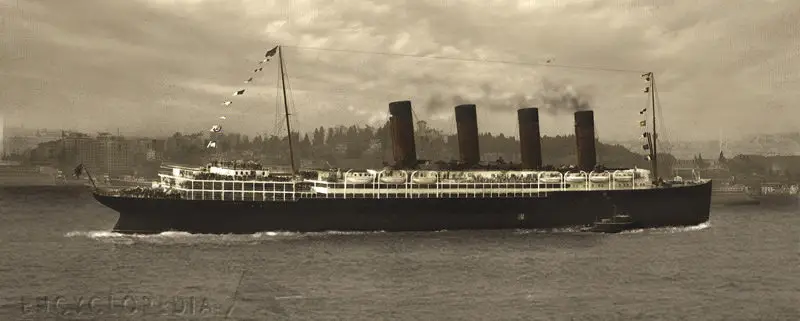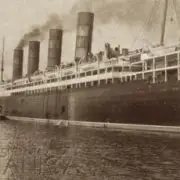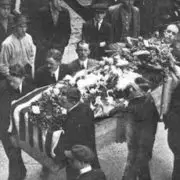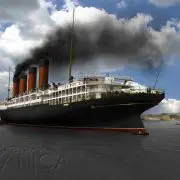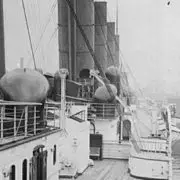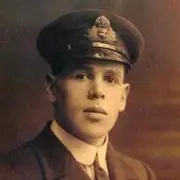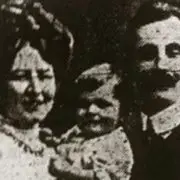The Lusitania : Part 15 : Happy Ending/Immortality
We part from Barbara McDermott on a happy note. We always do. She shows us a press clipping of herself as a school child, dressed in Egyptian garb at some long ago school function; a happy moment from 1926 preserved; Barbara, forever young, smiling and dressed as Cleopatra. Emily gazes down from the wall; her writing desk that she left, forever, when she departed Bridgeport in 1915, stands in the corner still actively used, and by the front window sits the doll carriage she gave her daughter the final time they saw one another. Assistant Purser Harkness smiles from by the door; a small, happy memory from that first awful day after the disaster.
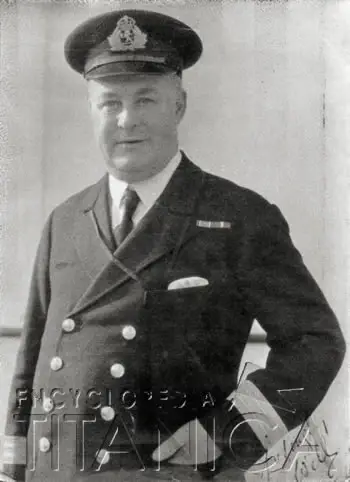
William Harkness
Courtesy of Muriel Harrison / Mike Poirier
She invites us to return and, of course, we accept. Departures from Barbara’s house are always cheerful and optimistic; “Now, don’t you drive up here in the winter when the roads are bad, but you come see me again in the spring!” Always “See you soon!” and never “Goodbye” at the door. On one occasion she presented us with home made shirts as departure drew near; on another, Afghans she had hand knitted over the previous winter.
Barbara causes one to ponder what a waste May 7th,. 1915 represented. Such a truly nice person who, in her nineties, has not lost her ability to love or look forward. What might the 1,198 fellow travelers who died that day have matured into?
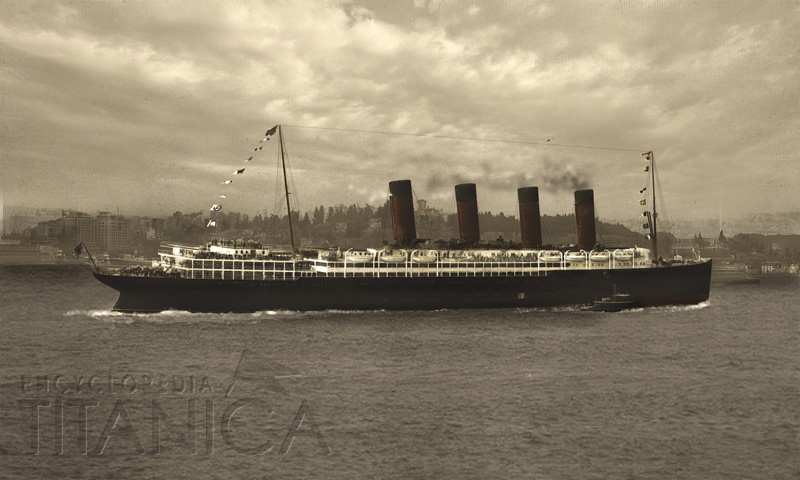
Immortality.
A year later later, it is still hard to believe that Barbara is gone. The last time we visited, in October 2007, she was in fine form and, as always, invited us back as we left. She fell ill after Christmas and, after series of recoveries and relapses, passed away in April 2008, leaving her family and circle of friends with several lifetimes’ worth of fond memories:
A summer barbecue at her house, to which she invited researcher friends, comes to mind. She felts bad about someone having to stand outside the house while grilling and miss the lively conversation. Her suggestion that the hibachi be set up inside her enclosed sun porch seemed…impractical… and in the end a compromise was reached, in which the hibachi was set up just outside the door of the porch so that the chef could listen in while cooking. She made a favorite dessert that day, and presented her guests with shirts and sundresses she had sewn herself as ‘thinking of you’ gifts.
Then there was an afternoon visit at which we discussed the ethical aspects of the disaster, and of the lingering sadness Barbara occasionally feltls when she thought about her mother. It was, perhaps, the heaviest conversation we ever had with her. A large dog, belonging to Barbara’s daughter and son in law trotted into the room. Four of us had met him before. One of us had not. Barbara had a crochet remote control holder, which fit over the arm of her couch. The dog lifted it off, remote control and all, and crossed the room to stand before The New Visitor. It wais visually quite amusing; it looked as though the dog was offering him the remote. The dog lay down, and placed the holder, with remote, on the floor between his paws. He looked expectantly at The New Visitor. “Shall I get that for you?” the visitor asked Barbara. “Yes, please do.” she replied. As he reached for the remote, the dog muttered. Not threateningly, but definitely a mutter which MIGHT have translated to “Go ahead, I dare you!” Another of our party quickly reached over the dog’s shoulder, snagged the remote and holder, and handed it back to Barbara. The dog retreated to another room. Conversation resumed, and then the dog returned carrying one of Barbara’s pretty pink face cloths. He stood in front of The New Visitor, as if offering him the towel. We all laughed, and the tragedies of 1915-1917 suddenly seemed a million miles away.
She would never fail to pray for you when you traveled.
She did not want anyone to “waste forty or fifty dollars” checking into a hotel when they came to visit her, and would gladly offer the use of her couch.
Posing with her for group photographs on the same spot in her front lawn, to mark the passing of another year was a tradition she particularly enjoyed and encouraged.
Her favorite actor was Tom Selleck. She had one of his posters hanging in her house, and would often speak of how he seemed like a nice guy.
She loved her hymnal, and regretted in her last few years that her vision was no longer strong enough to let her read music while at her piano.
Every piece of furniture in her house seemed to have a loving ‘history’ behind it.
The greatest injustice Barbara faced during her lifetime? Not the Lusitania disaster, with which she had made peace, but an occasion in which two “bad girls” pushed her over in school, and it was she who got her palms slapped with a ruler for creating a disturbance. Eighty plus years later, the memory still rankled. She would say the name of the principal, “Betsy J. Rattelsdorf,” with an elongated cadence and a harder inflection than her normal speech pattern.
She once showed us a merit certificate she saved from her school years. Signed by her nemesis, Betsy J. Rattelsdorf.
Perhaps the nicest night we spent with Barbara, was the occasion of her public speaking debut: It was in Newport, Rhode Island, before a large audience. Mrs. McDermott brought her beloved great-grandson C.J. to act as her escort for the weekend. Early on the evening of her scheduled appearance, a large group of liner buffs took her out to a restaurant for a celebratory meal. The room in which they were seated was upstairs, and had a nice view of the setting sun.
Barbara was seated towards the head of the table with C.J. She talked, animatedly, and showed no sign of flagging as the evening wound on. Someone jestingly suggested that we take her out dancing after her speech, and she quickly responded with “We just might.”
Cliff Barry flew over from England for the weekend. He found the “lost” grave in which Emily Anderson and her infant son were buried, at church expense, in 1916 and 1917. Still a pauper’s grave, money was needed to purchase it on Barbara’s behalf, and for a stone to mark it. Researcher Eric Sauder donated a Lusitania print to be auctioned on Barbara’s behalf, and it brought in a nice sum for the memorial fund.
Barbara spoke, and answered question from the audience. It was apparent that she was having a great time, and was not the least bit tired. An audience member mistook Barbara’s memory of walking up a tunnel in Liverpool to meet her grandparents as being a near death experience and asked, repeatedly, how Barbara could have died if she was safely in a lifeboat the entire time. Mrs. McDermott handled the answer well, and did not become rattled.
Shelley Dziedzic presented Barbara with a doll, painstakingly recreated from a Lusitania-era photo of Barbara in an elaborate, lacy, special occasion dress. For the rest of Barbara’s life, stood in its display case atop her piano, in front of and just below the beautiful portrait of Emily.
She seemed so remarkably happy, and excited, that she almost glowed.
It seems appropriate, somehow, to conclude this remembrance of the Lusitaniadisaster’s people on a happy note. Barbara frequently wished that she could meet and thank the man who saved her, Assistant Purser William Harkness. But, during the years it was possible that he might still have been alive, she had no idea how to go about finding him. Mike and Jim called every “Harkness” in the U.K. with a public phone listing, at one point, hoping to find his descendents, but with no success.
Mike and the Harknesses found one another through the Internet. One of Purser Harkness’s daughters is still alive. We learned that he spoke to his family about Barbara, and about how he was signaled by those in #15 to climb into the available space after helping Barbara and Emily aboard. His family says that the disaster aged him, and that he looked older than he actually was for the rest of his life. He died of a heart attack, in his bath, at age 52.
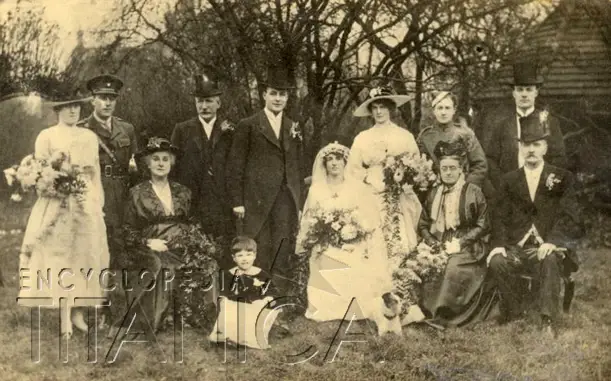
Wedding photo of William and Irene Harkness.
Courtesy of Leigh Harkness
Mike arranged a phone call between Barbara, and William Harkness’s daughter. Barbara described it as a “nice talk.” We did not press for details of what was discussed: it was enough to know that Barbara, in a way, had the chance to finally “meet” the man who gave her the next 91 years of her life on May 7, 1915. It was nice to know that Mr. Harkness’s daughter got to hear Barbara’s thanks first hand.
There was a tremendous explosion and it felt as if the ship was breaking up. In 20 minutes she had completely disappeared and hundreds of her passengers were swimming about hopelessly over her.
We lost 1,198 lives when the Lusitania went down, and we saved just over 700. Owing to the speed at which we were traveling, we were unable to stop when the torpedo struck us and this, of course, interfered with the launching of the boats.The torpedo struck us between the first and second funnels, and the ship filled immediately. The time at our disposal was altogether too short for us to do more than we did, but we did our best to get the boats into the water. We were less than seven miles from the Old Head of Kinsale, which was plainly visible.
We were struck at 2 o’clock in the afternoon, and at 2:20, the great 32,000 ton liner had vanished. She went down by the head and owing to the great length of 790 feet, she had struck the bottom in 240 feet of water before she finally vanished. The fact that she went down this way undoubtedly prevented the loss of life from being much greater. Had she gone down in any other way hundreds of people would have been drawn down and drowned by suction.
William Harkness,
Natal, 1933.
You will appreciate that as I was only 15 when dad died, and he was away a lot of the time, my memories are a bit limited.
I know I loved him dearly and we all looked forward to his homecomings, always with presents for us all, and outings, and meals out.
He was a very genial man but I think very capable, though not at jobs around the house! He was overweight, probably the result of all the rich food aboard ship, and he smoked, which probably contributed to his early death.
He prided himself on being able to tell a good story, which was an asset as he had his own table in the dining room.
I did go to see him off occasionally, and was shown around the ship and introduced to some passengers who were intrigued by my accent. My greatest impression was being shown around the kitchen and seeing the tremendous spread of cakes. I had to go on the Liverpool overhead railroad to the docks, and dad’s steward met me off the train. We did once go to Southampton, combining a week in London with seeing him off.
His assistant purser was Mr. Alf Martin and they were great friends, and their wives and families were friends, too. In fact, I still keep in contact with his son. Mr. Martin was purser on the Queen Mary all through the war…if my father had lived, he would probably got the job.
I remember he was on the Mauretania, and towards the end on the Antonia going to New York in winter and Montreal in summer.
~Muriel , William Harkness’s daughter. March 2008.
Lest We Forget.

